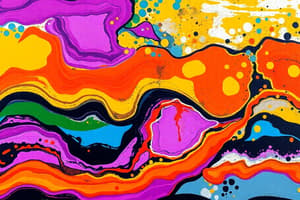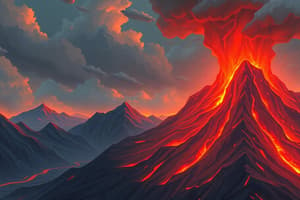Podcast
Questions and Answers
What is the primary product of magma formed by partial melting?
What is the primary product of magma formed by partial melting?
- Metamorphic rocks
- Volcanic ash
- Sedimentary rocks
- Igneous rocks (correct)
Which factor is NOT relevant to the composition of magma during its formation?
Which factor is NOT relevant to the composition of magma during its formation?
- Depth of source rock
- Color of source rock (correct)
- Texture of source rock
- Temperature of source rock
What characterizes equilibrium melting?
What characterizes equilibrium melting?
- Temperature remaining constant throughout
- Addition of external chemicals
- Removal of solid residue during melting
- Constant overall composition with evolving melt (correct)
What happens to the solid residue during equilibrium melting?
What happens to the solid residue during equilibrium melting?
Which of the following correctly describes fractional melting?
Which of the following correctly describes fractional melting?
What effect does decreasing pressure have on melting processes?
What effect does decreasing pressure have on melting processes?
The geothermal gradient varies due to which of the following factors?
The geothermal gradient varies due to which of the following factors?
Which process is primarily responsible for basaltic magma generation at ocean spreading ridges?
Which process is primarily responsible for basaltic magma generation at ocean spreading ridges?
What must the order of multiple qualifiers reflect in rock nomenclature?
What must the order of multiple qualifiers reflect in rock nomenclature?
Which prefix is designated specifically for metamorphosed igneous rock?
Which prefix is designated specifically for metamorphosed igneous rock?
Which type of rock must be classified using its phenocryst if no mode or chemical analyses are available?
Which type of rock must be classified using its phenocryst if no mode or chemical analyses are available?
Which IUGS classification term ranks highest in the hierarchy?
Which IUGS classification term ranks highest in the hierarchy?
What is the role of the prefix 'micro-' in rock nomenclature?
What is the role of the prefix 'micro-' in rock nomenclature?
Which of the following is a restriction when using the suffix '-bearing'?
Which of the following is a restriction when using the suffix '-bearing'?
Which of the following rocks is not classified as igneous according to the IUGS hierarchy?
Which of the following rocks is not classified as igneous according to the IUGS hierarchy?
Rocks believed to be pyroclastic in origin must be formed by which process?
Rocks believed to be pyroclastic in origin must be formed by which process?
What distinguishes a rock as a carbonatite?
What distinguishes a rock as a carbonatite?
Which of the following defines a melilite-bearing rock?
Which of the following defines a melilite-bearing rock?
What type of carbonatite is known for containing ankerite?
What type of carbonatite is known for containing ankerite?
Which rock is characterized specifically as plutonic melilite-bearing?
Which rock is characterized specifically as plutonic melilite-bearing?
When is a rock referred to as silicocarbonatite?
When is a rock referred to as silicocarbonatite?
How is a mixed pyroclastic-epiclastic deposit referred to?
How is a mixed pyroclastic-epiclastic deposit referred to?
Which melilite-bearing classification is named if perovskite exceeds 10%?
Which melilite-bearing classification is named if perovskite exceeds 10%?
What type of carbonatite is specifically found in the Oldoinyo Lengai volcano in Tanzania?
What type of carbonatite is specifically found in the Oldoinyo Lengai volcano in Tanzania?
Which of the following is NOT considered an accessory mineral?
Which of the following is NOT considered an accessory mineral?
What is the purpose of the Color Index / Mafic Index in igneous rock analysis?
What is the purpose of the Color Index / Mafic Index in igneous rock analysis?
Which of the following statements about Point Count Analysis is correct?
Which of the following statements about Point Count Analysis is correct?
Which mineral group does not contain potassium-bearing minerals?
Which mineral group does not contain potassium-bearing minerals?
Which reagent is used in the CIPW Norm for normative mineralogy?
Which reagent is used in the CIPW Norm for normative mineralogy?
What does Modal Classification refer to in the context of mineralogy?
What does Modal Classification refer to in the context of mineralogy?
What is the primary component range of Olivine?
What is the primary component range of Olivine?
Which of the following minerals is a member of the Pyroxene group?
Which of the following minerals is a member of the Pyroxene group?
Which mineral presence prohibits a rock from being classified as lamproite?
Which mineral presence prohibits a rock from being classified as lamproite?
What characterizes the molar K2O/Na2O ratio for Ultrapotassic lamproites?
What characterizes the molar K2O/Na2O ratio for Ultrapotassic lamproites?
Which type of Leucitite is characterized by foids being 60-90% felsic minerals and AF > P?
Which type of Leucitite is characterized by foids being 60-90% felsic minerals and AF > P?
Which of the following is NOT a characteristic of lamprophyres?
Which of the following is NOT a characteristic of lamprophyres?
Charnockitic rocks are characterized by the presence of which mineral?
Charnockitic rocks are characterized by the presence of which mineral?
Which of the following increases the complexity of lamproites?
Which of the following increases the complexity of lamproites?
What defines a Tephritic Leucitite?
What defines a Tephritic Leucitite?
What kind of alteration is often seen in lamprophyres?
What kind of alteration is often seen in lamprophyres?
Flashcards are hidden until you start studying
Study Notes
Magma Formation
- Magma consists of molten rock generated from the partial melting of the mantle and crust, primarily composed of silicates.
- The composition of magma is influenced by temperature, pressure, and chemical makeup.
Types of Melting
- Anatexis involves the partial melting of source rock, leading to liquid melt rich in low-temperature components while the remaining solid rock becomes enriched in high-temperature components.
- Factors influencing anatexis include the composition and texture of the source rock and its melting history.
- Equilibrium Melting maintains a constant overall system composition; as melting occurs, low-temperature components are enriched in the melt while high-temperature minerals dominate the solid residue.
- Fractional Melting separates solids and melt into isolated fractions, resulting in a more evolved melt compared to the parent rock.
Melting Factors
- Temperature increases with depth, represented by the geothermal gradient, which varies with tectonic setting and rock age.
- Decreasing Pressure leads to adiabatic melting, where the reduction of lithostatic stress allows for melting at lower temperatures, especially at ocean spreading ridges.
Common Minerals
- Quartz, feldspar (K-feldspar, plagioclase), and several mafic minerals like olivine and pyroxene are prevalent in igneous rocks.
- Accessory minerals occur in less than 5% abundance and include magnetite, hematite, and zircon.
Chemical Composition Terminology
- Mafic Index quantifies the proportion of mafic minerals:
- Formula: %mafic/(%mafic + %felsic) x 100.
- Modal Classification identifies mineral presence and volume percentages through visual inspection or thin section analysis.
Modal Analysis Techniques
- Point Count Analysis offers a detailed modal classification by tabulating mineral occurrences in thin sections through a grid method.
- Normative Mineralogy (CIPW Norm) uses chemical analysis to mimic actual minerals, aiding in rock classification.
Igneous Rock Nomenclature Rules
- Nomenclature involves adding qualifiers to describe mineral content and texture, ensuring clarity and compliance with established definitions.
- A hierarchy is present in using IUGS classifications, prioritizing special rocks before standard classifications.
Pyroclastic Rocks and Tephra
- Classification of pyroclastic rocks is reserved for deposits formed by explosive fragmentation, excluding those formed by autobrecciation.
- Mixed pyroclastic and epiclastic deposits are referred to as tuffites, categorized by grain size.
Carbonatites Classification
- Carbonatites must contain over 50% modal carbonates and can be classified as volcanic or plutonic based on mineral content.
- Variants include Sövite (calcite-rich) and Alvikite (medium to fine-grained), with ferrocarbonatite indicating the presence of iron-rich carbonate.
Melilite-bearing Rocks
- Defined by containing at least 10% modal melilite; classification varies for plutonic (melilitolite) and volcanic (melilitite) forms.
- Specific names are given based on dominant mineral presence, with strict guidelines on priority and abundance.
Lamproites and Leucite-bearing Rocks
- Lamproites difficulty separates chemically, distinguished by occurrence as dikes and specific mineral compositions.
- Leucite-bearing rocks use prefixes indicating the presence of leucite and are subdivided based on mineral composition.
Lamprophyres and Charnockitic Rocks
- Lamprophyres are characterized by specific porphyritic textures and essential biotite or amphibole.
- Charnockitic rocks require the presence of orthopyroxene and perthite for classification within the charnockitic suite.
Studying That Suits You
Use AI to generate personalized quizzes and flashcards to suit your learning preferences.




